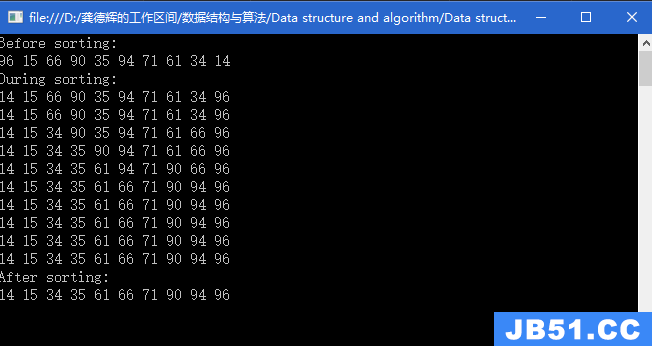今天我在黄国瑜的《数据结构》一书中看到一段代码:于用栈链表来实现中序表达式,代码如下:
#include <stdio.h>
#include <stdlib.h>
#include <stdlib.h>
struct s_node
{
int data;
struct s_node *next;
};
typedef struct s_node s_list;
typedef s_list *link;
link operator=NULL;
link operand=NULL;
link push(link stack,int value)
{
link newnode;
newnode=(link)malloc(sizeof(s_list));
if(!newnode){
printf("\nMemory allocation failure!");
return NULL;
}
newnode->data=value;
newnode->next=stack;
stack=newnode;
return stack;
}
link pop(link stack,int *value)
{
link top;
if(stack!=NULL){
top=stack;
stack=stack->next;
*value=top->data;
free(top);
return stack;
}
else
*value=-1;
}
int empty(link stack)
{
if(stack==NULL)
return 1;
else
return 0;
}
int is_operator(char operator)
{
switch(operator){
case '+': case '-': case '*': case '/': return 1;
default:return 0;
}
}
int priority(char operator)
{
switch(operator){
case '+':case '-':return 1;
case '*':case '/':return 2;
default: return 0;
}
}
int two_result(int operator,int operand1,int operand2)
{
switch(operator){
case '+':return (operand2+operand1);
case '-':return (operand2-operand1);
case '*':return (operand2*operand1);
case '/':return (operand2/operand1);
}
}
void main()
{
char expression[50];
int position=0;
int op=0;
int operand1=0;
int operand2=0;
int evaluate=0;
printf("\nPlease input the inorder expression:");
gets(expression);
while(expression[position]!='\0'&&expression[position]!='\n'){
if(is_operator(expression[position])){
if(!empty(operator))
while(priority(expression[position])<=priority(operator->data)&&!empty(operator)){
operand=pop(operand,&operand1);
operand=pop(operand,&operand2);
operator=pop(operator,&op);
operand=push(operand,two_result(op,operand1,operand2));
}
operator=push(operator,expression[position]);
}
else
operand=push(operand,expression[position]-48);
position++;
}
while(!empty(operator)){
operator=pop(operator,&op);
operand=pop(operand,&operand1);
operand=pop(operand,&operand2);
operand=push(operand,operand2));
}
operand=pop(operand,&evaluate);
printf("The expression[%s]result is '%d'\n",expression,evaluate);
}
执行时有一个警告:
查资料知在gcc编译器中没有gets函数,只有fgets,在这里为了结果的正确就不改了。这样也可以执行。
可是呢,在执行的时候,当你执行1+1,2*3,1+2*3,等等类似的表达式都是正确的,可是当执行1+1+1,2*3+1这样的时候就出现段错误,为什么呢?分析表达式,看出只要是前面的运算符小于后边的运算符时都是正确的,大于等于时都错了。
后来经过调试,发现第87行改为这样就对了:
之前:
while(priority(expression[position])<=priority(operator->data)&&!empty(operator))
改后:while(!empty(operator)&&priority(expression[position])<=priority(operator->data))
因为当输入运算符时要进行与上一次运算符的比较,如果这次的运算符优先级高于上一次的话,就执行下面的语句,执行完语句后,再次进行判断优先级,按照未改之前的看,当执行到priority(operator->data)时就出错了,因为i这时operator就是空了,它没有data了,所以出现了段错误。把empty(operator)提到前面来,进来后直接判断,为空直接执行while之外的语句,这样就对了。
(后记:虽然刚刚接触gdb,可是真好用,这次就是用它找到段错误的,要不是用它,不知道又得折腾到什么时候呢!)

 匿名组 这里可能用到几个不同的分组构造。通过括号内围绕的正...
匿名组 这里可能用到几个不同的分组构造。通过括号内围绕的正... 选择排序:从数组的起始位置处开始,把第一个元素与数组中其...
选择排序:从数组的起始位置处开始,把第一个元素与数组中其...